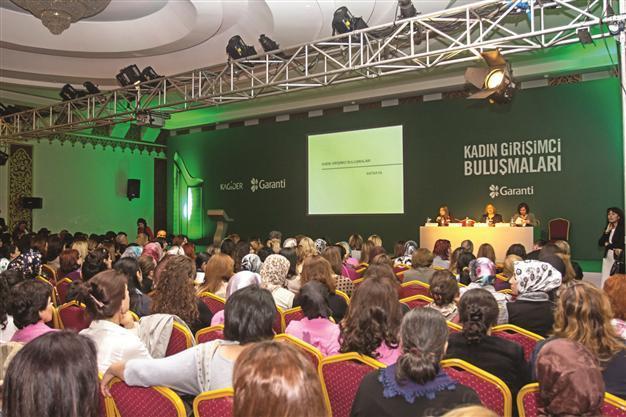Garanti’s businesswomen scheme a regional model
HATAY - Hürriyet Daily News

Garanti Bank holds a mini-seminar on business strategies for women entrepreneurs in the southern province of Hatay. The bank also cooperates with Women Entrepreneurs Association in organizing the ‘Female Entrepreneur of the Year’ award.
Turkish soap operas, which are widely watched all over the Middle East, are well-known for being one of the most influential tools of Turkish soft power. This soft power, however, does not stem merely from TV soaps, but has also manifested itself in other areas – especially the economy.
Amid debates on whether Turkey can be a model for the countries of the Arab Spring, Turkey is already being picked by some international financial institutions as a model that the Arab countries can learn from, particularly in terms of fostering female entrepreneurs.
Efforts by Garanti Bank, one of Turkey’s most prominent private banks, to increase the number of Turkish female entrepreneurs have attracted the attention of the European Bank of Reconstruction and Development (EBRD), as well as the International Financing Cooperation (IFC), so much that they are now in the process of showcasing Garanti Bank’s approach as a best practice in the Middle East.
Selin Öz, Garanti Bank’s small enterprises marketing manager, has gone to the region twice since the beginning of the year to explain the bank’s three-pronged strategy.
The first leg of the scheme was implemented after the bank designed a financial support package for businesswomen featuring lower interest rates in the first half of the 2000s.
But making financial instruments available to women was insufficient, according to officials at the bank. “More research showed us the need to raise awareness and increase education and encouragement to increase the number of female entrepreneurs. But, as a bank, we could not do much on our own to address these issues. This is when we approached the Women Entrepreneurs Association of Turkey [KAGİDER],” said Garanti Bank Executive Vice President Nafiz Karadere.
As part of the support project, Garanti Bank and KAGİDER joined hands to organize the “female entrepreneur of the year” award. “We only had 108 applications in 2006; this year, we had more than 6,000,” said Öz.
The award was followed by meetings in different Anatolian cities that addressed the issue of awareness and education by gathering businesswomen and inviting experts to share clues about how to start up businesses and expand them.
Business educationOne such mini-seminar was held April 16 in Antakya, where a hotel room packed with women heard tips on business strategies that included everything from how to use body language to how to write an executive summary. The audience, which included several headscarved women, came from all walks of life – including Saliha Şeren, who did not know where to start. “I worked as a salesperson, but stopped working when I had kids. Now they are grown up and I want to go back to work,” she said.
“Things today were not as they were 10 years ago. Don’t forget to adapt to changes,” said Gülay Özkan, the founder of Geds Business.
“There is curiosity as to how we succeeded to implement this strategy in the field,” said Öz in reference to Garanti Bank’s three-pronged approach, which was also elaborated upon at a workshop in Cairo last month, following an invitation from EBRD.
“We have 1,500 small and medium-sized enterprises, SME relationship managers working throughout Turkey, and they are all aware about the concept of female entrepreneurs,” Öz told the Hürriyet Daily News.
This awareness seems to be even more important than the “positive discrimination” policy that the bank has adopted in proposing lower interest rates for businesswoman. “The recognition that there is such a category as a female entrepreneur is very important. In some bank offices, women are told, ‘Where is your husband? You go get him to come instead.’ Some women in rural parts of Turkey are even afraid of entering a bank,” said KAGİDER head Gülden Türktan.
“I have tried to pass across the message that banks should not take this issue as a social responsibility project. This is a profitable endeavor for banks,” said Öz, who was also invited by the IFC to a meeting in Beirut in January where Garanti Bank’s scheme was explained as a best practice to representatives of banks from the Middle East.
“My observation is that mid-level officials have difficulty getting it accepted by the top administration. We are lucky since in our case the top administration fully endorses our approach to businesswomen,” said Öz.
